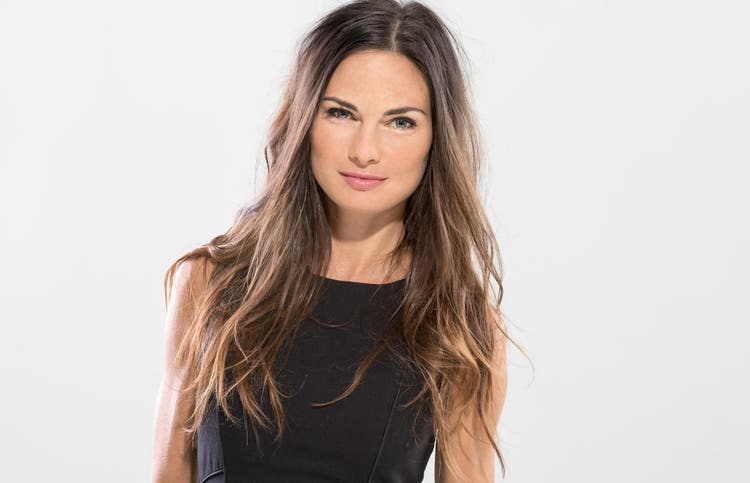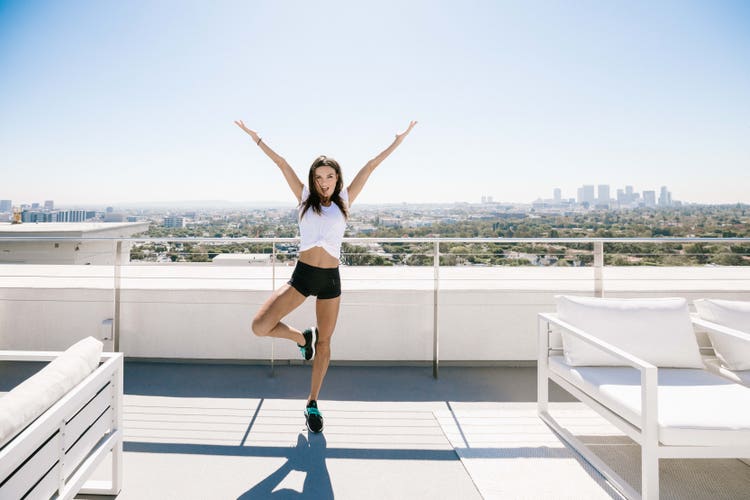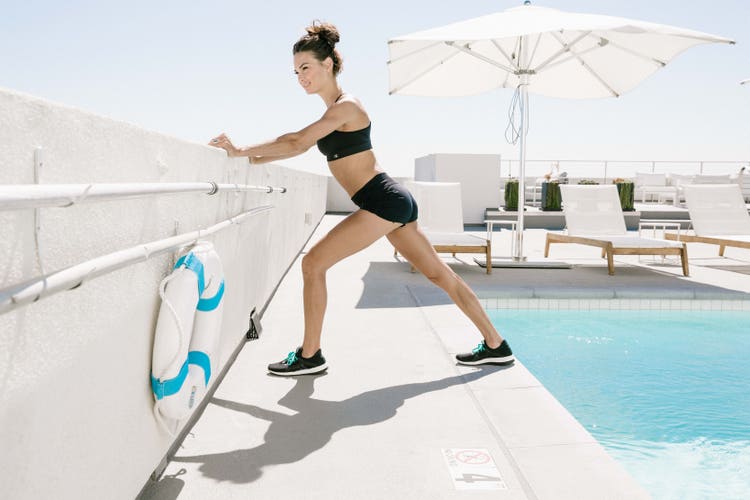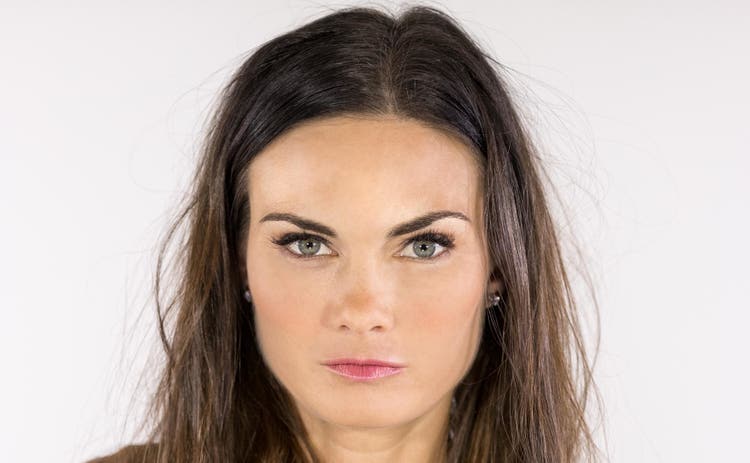Amanda Russell on Becoming a Self-Made Fitness Influencer

What does it take to turn a passion into a side hustle, and a side hustle into a business? Fitness influencer Amanda Russell, the creator of Fit, Strong, and Sexy, shared her story with 24Life—including how she landed a high profile corporate job with zero corporate work experience, and built a digital fitness empire using YouTube, despite her family’s concerns about taking an unconventional path to success.
24Life: How did you become a fitness influencer?
Amanda Russell: Well, definitely not according to any traditional “how-to” approach. I think there are too many misconceptions about how to begin, which training program is the best and what type of experience you need. You could spend a lifetime trying to figure out “the best path,” and everyone has their own opinion. If I had taken the popular advice I received, I would not be where I am now. My approach: Take action and just get started.
I came to the U.S. from a small town in Canada, on a track and field scholarship. [Russell ran the 5,000 and 10,000 meter.] After qualifying in Olympic trials, I broke my femur at the neck in a way that’s almost impossible (unless you get hit by a truck). It was a stress fracture that cracked right through at the neck where your leg meets your hip. I was devastated. In a matter of one week I lost not only my ability to run, but my Olympic dream, my career, my sponsors, my identity—and my life would be forever changed.
Surgery was too high-risk because of the location of the break, so I was on bed rest for eight months. I learned to walk again in the water, I slowly progressed to non-impact activities like cycling, and I experimented with every form of exercise to see what could truly get me back into shape with my new physical limitations. That was 10 years ago, and I have since acquired many certifications and educational training. But it is my lifetime of physical training, both as a competitive athlete and as someone having to start back from zero, to which I attribute my influence in the space. I believe real experience and passion for change trumps anything I could learn in a course. In fact, I created my own certification in the method of fitness I teach!

24Life: Was it an obvious transition from competitor to fitness influencer?
AR: Hah—it was more like an obstacle course. I decided if I couldn’t go to the Olympic Games, which I believe to be the pinnacle in the athletic world, then I wanted to pursue a corporate career, and therefore wanted to go to New York City, which I believe to be the pinnacle of the corporate world in America. After the injury, I either had to pack up and go home to live with my parents in my small Canadian town, or I had to figure out a way to get a corporation to sponsor me to stay in the U.S.; meaning get a corporate job without any experience.
Everyone around me told me I had no chance, and if we are talking about traditional transitions, they would be right. But I don’t believe in conventional; there’s always a way, so I used what I had, which is my running ability. I couldn’t compete on experience because I didn’t have it, but I could compete on my work ethic, and my ability to pour a ton of energy into a company. We need to stop trying to compare ourselves to others, and find out what we do have, and use that to add value and shine in a way in which no one else can compete. That’s when the magic happens.
So how did I get the job? I set my focus on three big international consulting firms, and I sent each firm a box of my sneakers (I was sponsored by Nike) with a note that said, “I don’t have work experience, but I have all this energy and work ethic I can pour solely into your company.” And that was how I got my first job. The VP that made the decision to hire me is now a senior executive at Snapchat and to this day, we’re very good friends, and he tells that story.
I knew that was not what I was going to be doing for the rest of my life, but it was a stepping-stone. Too often we get caught up in the short-term, what’s directly in front of us, versus seeing the long-term, the bigger picture. I used that job as a way to live in New York and gain experience, while I also saved 80 to 90 percent of every paycheck so I could make the full first semester payment of business school, which was my next step on my long-term journey.
It was when I started business school that I landed a modeling campaign and signed with Wilhelmina, which helped financially and also opened new opportunities, which I worked to optimize at every chance.
24Life: How did you create visibility for yourself and your personal brand?
AR: During the time I spent modeling, I was meeting editors and decision makers at major magazines and brands. I would talk to every one of them, learn their brand goals and find out how I could contribute, and thus present my mission of creating an online fitness community. Then anyone and everyone became my audience.
You see, whenever you’re passionate about something, people ask you about it, and you naturally just talk about it. However, explaining fitness is challenging, so I purchased a flip cam to start showing and sharing my fitness method and used YouTube as the distribution channel, and THAT is when the light bulb went off! I was doing a marketing concentration at business school, so I made my thesis about how you can have the best product or service in the world, but if you don’t have an audience, it doesn’t matter, and with new social sharing platforms like YouTube, ANYONE could [build an audience] without a major capital investment.
This also allowed me to bridge the two things I really love the most: fitness and marketing. To build an audience, first you have to build trust and demand, no matter what it is. People trust people, and thus I built a business. I ended up winning an award and sponsorship from YouTube and not going back to my cubicle.
Next, I created an online subscription for my content and Trium Entertainment (the creators of “The Biggest Loser”) became my business partner in the online platform, and we learned from and complemented each other. I saw a gap in the market and so did they, as companies were still using traditional and often templated approaches to marketing. I witnessed this when hiring firms for my own brand, and that sparked the beginnings of my own consulting and marketing agency. I knew I could do it better, and I knew how much I cared, so it was up to me to help other businesses do the same.
The entire segment of digital marketing, collaboration, influencers and social media, became my world, and I garnered a level of expertise few could compete with, as I had been on both sides of it and had grown up with it from its very infancy. This is how I ended up teaching at UCLA, and I created an entirely new course there called Influencer Marketing. I’m also bringing these insights together into a book, “The Influence Code.”

24Life: How did your family and those around you react to you leaving your corporate job to work with YouTube?
AR: Well, when I graduated business school and told my parents that I was going to do YouTube for a living, I know they thought I was out of my mind. My parents both came from humble backgrounds and believed education is the only way to secure opportunity. They also worried about where I would end up, as this path didn’t even exist in history. But I had a strong vision and a blind confidence I would get there.
I’ve since seen a common thread among many entrepreneurs and leaders who find success, and it is that they have this unwavering confidence about what they’re going to do, and nothing can take that away. It doesn’t matter if there is no glamour, praise or fancy title—because there is a feeling of a higher purpose, one that isn’t swayed by distractions or superficial status.
24Life: What does it mean to be an influencer?
AR: I think that everybody has the power to be an influencer. If you look at the definition of influence, it is the power to affect or change behavior. That applies to anyone. We think of celebrities and social media stars as influencers, but really, the most influential people on your life are the people in your immediate personal and professional circles. For example, just look at the relationship between a personal trainer and client. If you see an ad with a celebrity drinking a certain protein powder, are you going to go out and buy that protein powder? Probably not. But if your trainer tells you that he thinks you should buy a certain protein powder, the chances of you going out and buying that powder are pretty high.
How do you build your influence up to a larger scale? That’s a different question and it has a different answer (in my book!). But I think we all have the ability to affect or change behavior.
24Life: What advice would you give to someone who is just getting started and wants to make a little money and begin to build his or her influence?
AR: Honestly, I would do exactly what I did all over again. Fitness takes almost no capital to get started. If you have little experience, I do recommend getting appropriate certification. It’s quite easy and most gyms and institutions won’t hire you without one. When I started out, I needed to start making money right away, so I led my own classes outside. I made flyers, printed them out, and put them in every coffee shop around the West Village. I was my own marketing advocate.
In order to get experience and influence, you have to create it. And you could do that for anything. Too many people continue to wait: “Once I do this,” and, “Once I do that.” Just get started. No one’s going to give you something unless you’ve got something to offer, so go create your experience, showcase the value you bring and build it yourself.

24Life: People can get really overwhelmed when it comes to social media. What advice do you have for someone about where to begin, in the digital-first world?
AR: First of all, do not get on every platform, because then you’ll actually get nothing accomplished. Think about what you’re really good at and passionate about. I love video, because I can talk all day. I love talking to the camera. That was my thing, the video camera. But for somebody else, that might not be their thing. Personally, I don’t like to take pictures. I don’t selfie everything I do. So I don’t use Instagram as a platform for my businesses at all, because it’s not authentic to me. It’s got to be something you naturally gravitate to. So if you’re writing a journal every day, create a blog and then get writing.
Pick that one thing that really is your wheelhouse, that you can see yourself doing, that you’re actually passionate about. Authenticity can’t be faked.
Photo credit: Tom Casey, box24studio.com
Hair and make-up: Chanel